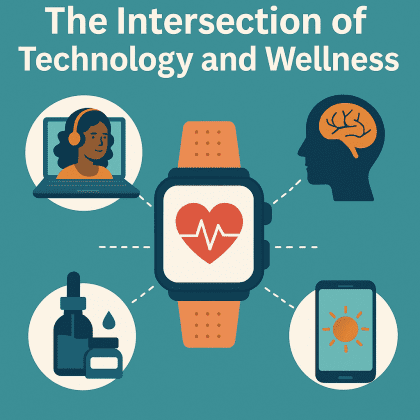The pursuit of wellness has evolved far beyond traditional practices. Technology, once viewed as a barrier to well-being, is now becoming a vital enabler of healthier, more balanced lifestyles. For the modern African woman seeking harmony between career, family, and self-care, tech-enabled wellness offers both convenience and personalization like never before.
From Wearables to Wellness Apps
One of the most visible intersections of technology and wellness is in the rise of wearable devices. Smartwatches and fitness trackers have transformed how people monitor their health. From tracking steps and heart rate to analyzing sleep patterns, wearables offer real-time data that empowers individuals to make informed decisions about their health.
In addition to wearables, wellness apps are helping users manage stress, sleep, hydration, nutrition, and mental health. Apps like MyFitnessPal, Calm, Headspace, and Fitbit provide guided workouts, meditation sessions, meal tracking, and mindfulness reminders—all accessible via smartphone. For African women juggling multiple roles, these digital tools can bring structure and accountability to wellness routines.
Mental Wellness Goes Digital
The stigma around mental health is slowly diminishing, and digital platforms are playing a critical role. Teletherapy apps and online counseling services such as Wazi, Mindful, and even WhatsApp-based support groups are breaking geographical and social barriers. This democratization of access has been particularly impactful in underserved areas where mental health services were once hard to find.
Technology also fosters mental wellness through content. Podcasts, YouTube channels, and Instagram pages now serve as powerful platforms for sharing stories, tips, and support. These tools help users feel seen and heard, and create virtual communities centered on healing and growth.
Personalized Health through AI and Data
Advancements in artificial intelligence (AI) and data analytics have opened new frontiers in personalized wellness. AI-driven platforms can analyze user data to provide tailored health insights. Whether it’s a personalized workout based on menstrual cycles or diet suggestions based on genetic predisposition, AI ensures wellness is not one-size-fits-all.
African health-tech startups are also joining this movement. Companies are creating platforms tailored to local needs—from maternal health tracking to chronic illness management—leveraging data to improve outcomes and deliver culturally relevant solutions.
Tech-Enhanced Skincare and Beauty
Wellness isn’t only internal—it’s also about how we feel in our skin. The beauty tech boom is seeing AI-driven skin analysis, virtual makeup try-ons, and ingredient-scanning apps becoming mainstream. African beauty brands are adopting tech to educate consumers about product ingredients, skin types, and the benefits of natural and organic beauty solutions.
At Waridi, we understand that true beauty begins with wellness. That’s why we’re keeping an eye on how innovations in skincare diagnostics and digital consultations can help our clients make more informed beauty decisions—empowering them to glow from the inside out.
Smart Homes for Holistic Health
The smart home movement is influencing wellness as well. Smart lighting that adjusts to circadian rhythms, air purifiers with sensors, sleep-enhancing tech like white noise machines, and even refrigerators that recommend healthy recipes—technology is being woven into the fabric of wellness-focused living environments.
These innovations can be especially valuable for African households navigating urban pollution, erratic work schedules, and increasing stress levels. Creating mindful spaces using technology is now more feasible and more important than ever.
The Challenge: Balance
While the benefits of tech-enabled wellness are clear, the challenge lies in maintaining balance. Too much screen time, digital fatigue, and over-reliance on apps can be counterproductive. It’s crucial to use technology mindfully—letting it support your well-being without allowing it to control your routines.
Setting digital boundaries, unplugging regularly, and staying rooted in holistic self-care practices like nature walks, journaling, and herbal remedies can provide a healthy counterbalance to the high-tech wellness lifestyle.
Conclusion
The intersection of technology and wellness is redefining what it means to live a healthy life. It’s no longer just about hitting the gym or eating your greens—it’s about integrating smart, supportive tools into your daily rhythm. For African women leading dynamic, multidimensional lives, embracing tech-enabled wellness can offer the edge needed to thrive with grace and power.
As we move forward, platforms like Waridi continue to explore how technology can enhance beauty, health, and self-expression in a way that honors our unique identities and cultural wisdom.


